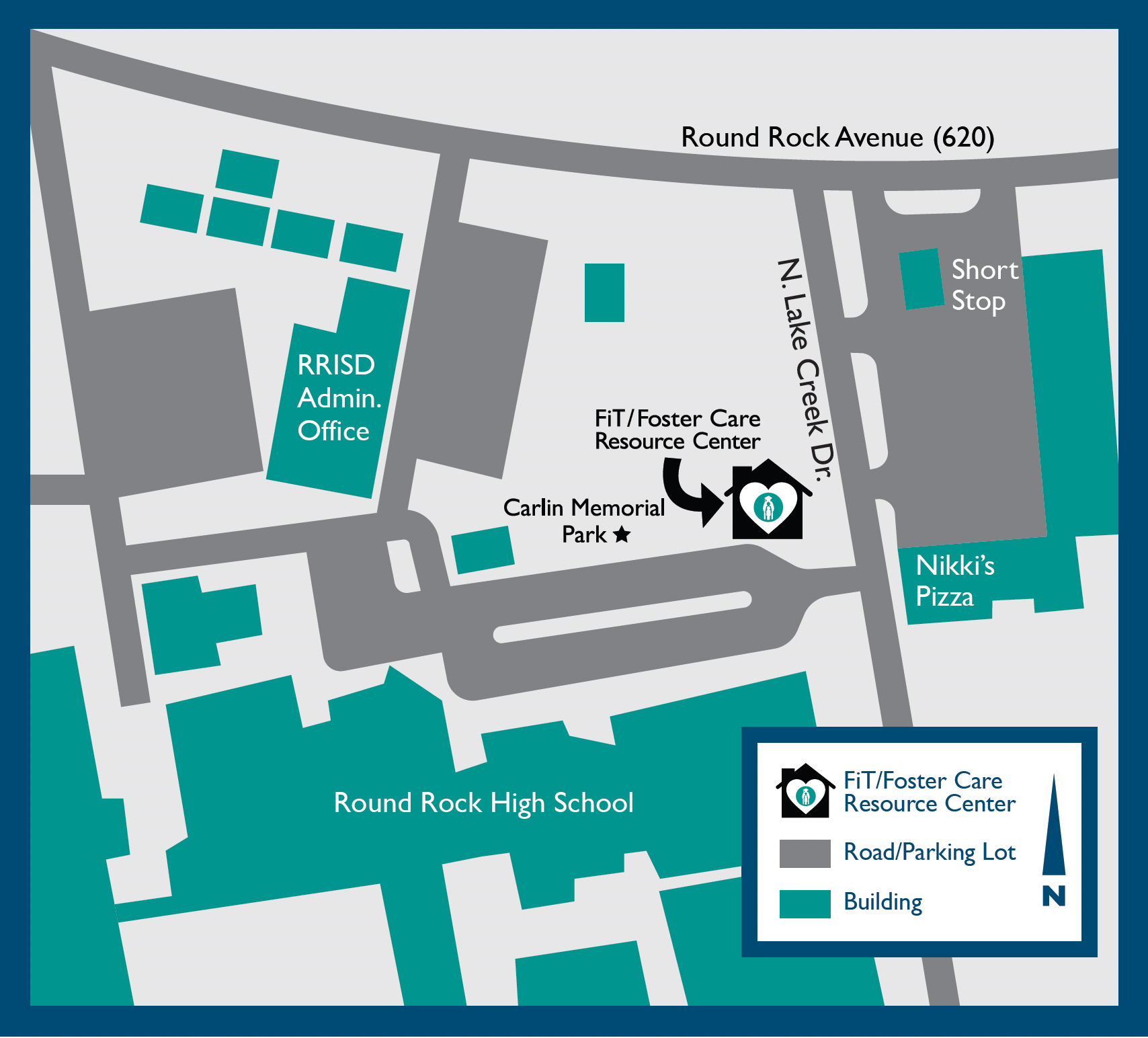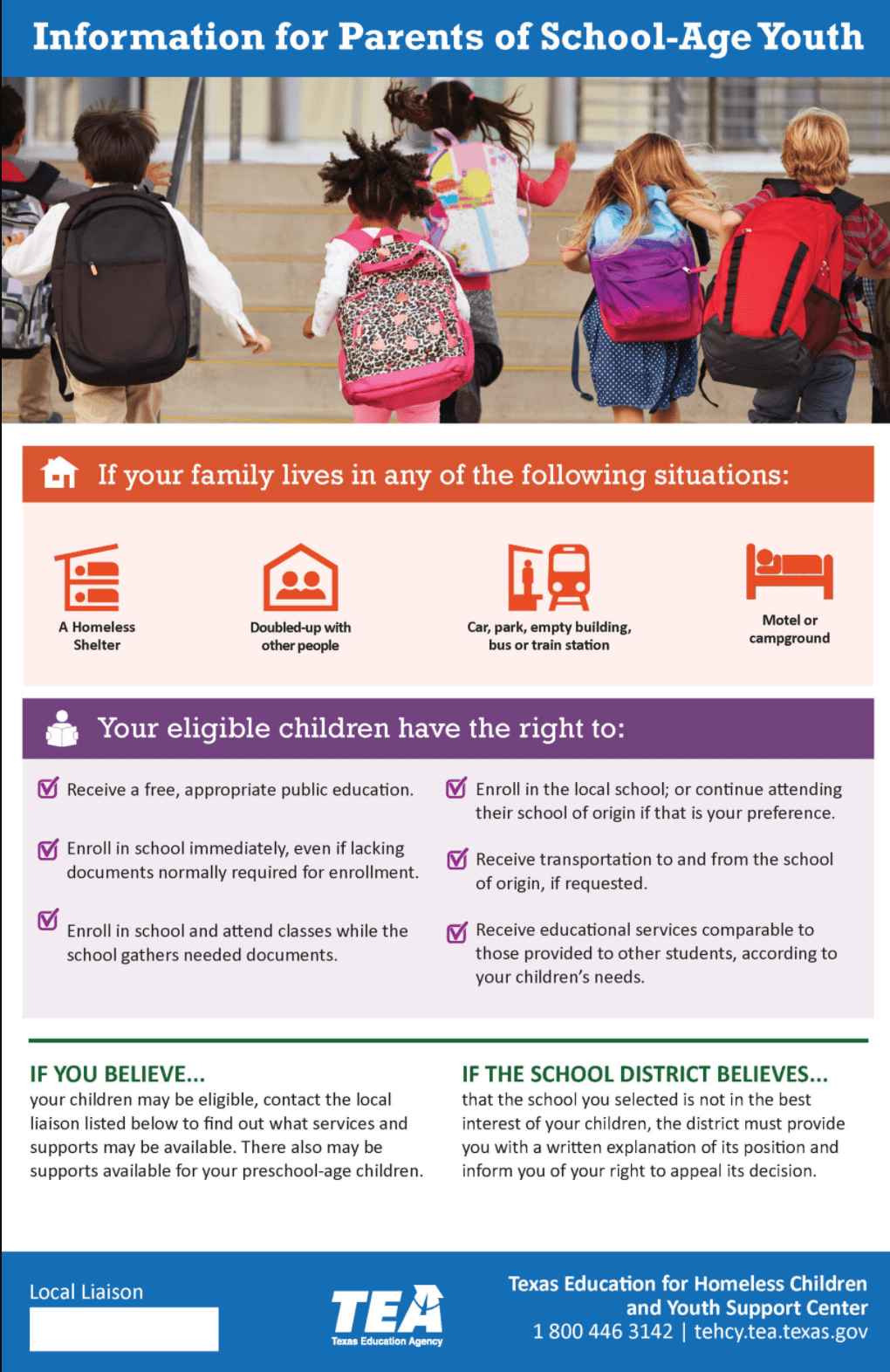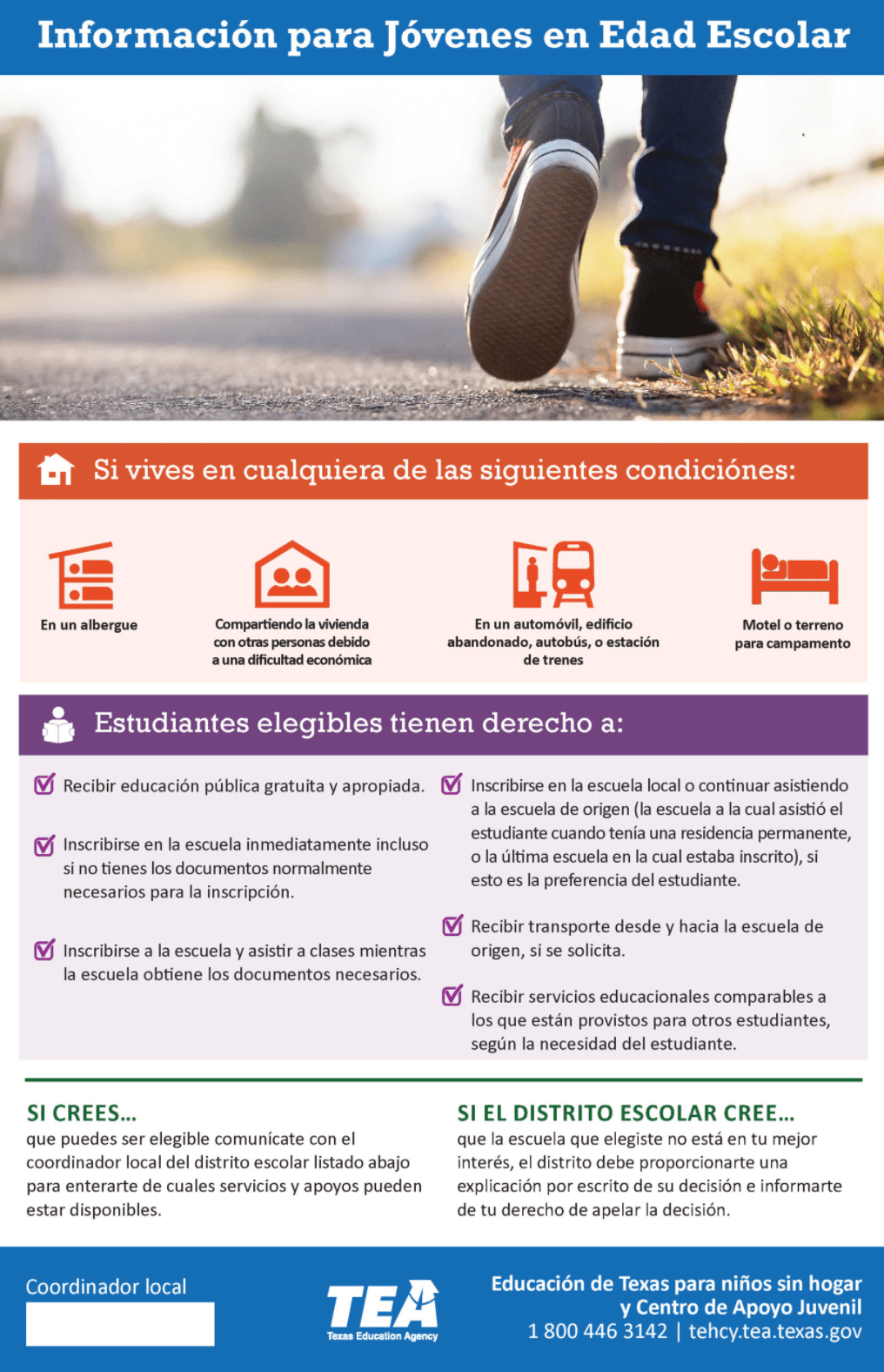
Families in Transition
About Us
The Round Rock Independent School District Family Families in Transition (FiT)/ Homeless Education Program office is committed to ensuring that all children in homeless situations have the opportunity to enroll in, attend, and succeed in school. FiT assists in providing programs and opportunities that might not otherwise be available for those students. FiT is committed to enhancing student learning by impacting the quality of education. This is accomplished by offering enhanced opportunities and resources available in the community.
The Families in Transition Homeless Education Program Services
- Enrollment assistance, and birth certificates for Texas born students
- Free school meals
- Tuition fees for summer school
- Prekindergarten enrollment assistance
- School supplies
- Parent education resources
- Community referrals for needed resources
- Counseling referrals
- Provide transportation to homeless student’s school of origin
- Raising awareness and provide specific training for educators and the community
- Ensuring homeless students have access to appropriate existing services (e.g., early childhood programs, special education programs, gifted and talented programs, etc.)
- Coordinating with existing programs (e.g., Head Start, programs for adolescents, and housing agencies)
Contact Information
If you need assistance, please contact our program personnel at 512-464-5051.
FiT Brochure
What Families in Transition need to know
Is your residence or housing uncertain?
Do you live at a temporary address?
Round Rock ISD has many services to support students’ academic needs.
>> Families in Transition Brochure – English
>> Families in Transition Brochure – Spanish
Donate
ONLINE
Donations are received thru the Round Rock ISD Estore. Click here to donate online
Your donation goes directly to our students and families experiencing homelessness FiT program.
Thank you for helping us ensure success in education for youth who are experiencing homelessness.
BY MAIL or IN PERSON
Round Rock ISD
Families in Transition (FiT) Program/State & Federal Programs
1311 Round Rock Avenue
Round Rock, TX 78681
Who are Homeless Children and Youth?
- Children and youths who lack a fixed, regular, and adequate nighttime residence, including children and youths who are:
- Sharing the housing of other persons due to loss of housing, economic hardship, or a similar reason.
- Living in motels, hotels, trailer parks, or camping grounds due to lack of alternative adequate accommodations.
- Living in emergency or transitional shelters.
- Abandoned in hospitals.
- Awaiting foster care placement.
- Children and youths who have a primary nighttime residence that is a public or private place not designed for, or ordinarily used as, regular sleeping accommodations.
- Children and youths who are living in cars, parks, public spaces, abandoned buildings, substandard housing, bus or train stations, or similar settings.
- Migratory children who qualify as homeless because they are living in the circumstances described above.
- The term unaccompanied youth includes a youth not in the physical custody of a parent or guardian. This would include runaways living in runaway shelters, abandoned buildings, cars, on the streets, or in other inadequate housing; children and youths denied housing by their families (sometimes referred to “throwaway children and youths”); and school-age unwed mothers living in homes for unwed mothers because they have no other housing available.
Community Resources
Austin Shelter for Women and Children
(512) 933-0600
Bluebonnet Trails Community MHMR Center
(512) 255-1720
Catholic Charities of Central Texas
(512) 651-6100
Workforce Solutions Capital Area – Child Care Services
Travis Co. information; (512) 597-7191
Williamson Co. information; (512) 244-2207
Foundation for the Homeless
(512) 453-6570
Georgetown Housing Authority
(512) 863-5565
Head Start
(512) 255-4536
Hill Country Community Ministries (Assistance with food, clothes, eye exams, and other needs)
(512) 259-0360
Hope Alliance/Williamson County Crisis Center (WCCC)
(512) 255-1212; Hotline: (800) 460-SAFE (7233)
Housing Authority of the City of Austin
Public Housing: (512) 477-4488; Section 8: (512) 477-1314
Housing Authority of Round Rock
Public Housing (512) 255-3702; Section 8: (512) 255-1336
Housing Authority of Taylor
(512) 352-3231
Housing Authority of Travis County
(512) 480-8245
Job Source Program – Goodwill
(512) 637-7100; Job Line: (512) 637-7105
Lone Star Circle of Care
AW Grimes Medical Office: (512) 238-5400
Round Rock Health Clinic: (877) 800-5722
Dental Clinic: (512) 864-1445
OB/GYN: (512) 828-3300
Round Rock Area Serving Center (Assistance with food, clothing, furniture, computers, financial assistance)
(512) 244-2431
Round Rock Public Library
(512) 218-5400
Sacred Heart Community Clinic
(512) 716-3929
Salvation Army Shelter
(512) 476-1111
Safeplace
(512) 267-7233; TTY: (512) 927-9616
Starry (Counseling services)
(512) 388-8290
Texas Baptist Children’s Home Family Care Program
Main: (512) 255-3682; (512) 828-0658
Texas Child Abuse Hotline
1-800-252-5400; TTY: 1-800-735-2989
The Texas State University Counseling Practicum Clinic (Counseling services)
(512) 716-4250
Texas Workforce Center (TWC of Williamson County)
Rural Capital Workforce ; (512) 244-2207; Toll Free: (866) 518-0576; TTY: (800) 735-2989
Work In Texas
United Way of Williamson County
(512) 255-6799
Williamson County Health Department (Assistance with immunizations)
Cedar Park: (512) 260-4240
Round Rock: (512) 248-3257
Taylor: (512) 352-4109
Georgetown: (512) 943-3640
YMCA
Travis Co. information; (512) 236-9622
Williamson Co. information; (512) 246-9622
Agency Information
Social Security Administration Hotline;
1-800-722-1213; TTY: 1-800-325-0778
National Runaway Safeline;
1-800-422-4453
Texas Homeless Education Office;
1-800-446-3142
Texas Youth & Runaway Hotline;
1-800-989-6884
CARTS – Williamson County; 512-478-7433
Unaccompanied Youth
Unaccompanied youth have the same rights as other students experiencing homelessness to enroll in, attend, and succeed in public school.
Young people experiencing homelessness live:
- In shared housing with other persons due to loss of housing, economic hardship, or a similar reason. When families “double up” because one family is experiencing financial hardship, that family is considered homeless.
- In motels, hotels, or camping grounds due to the lack of adequate alternative accommodations
- In cars, parks, public spaces, abandoned buildings, substandard housing, bus or train stations, or similar settings
- In emergency or transitional shelters
- In hospitals where they were abandoned
- In foster care homes awaiting placement
In determining whether or not a child or youth is homeless, consider the relative permanence of the living arrangements. Determination of homelessness should be made on a case-by-case basis.
The McKinney-Vento Homeless Assistance Act
The education provisions of the McKinney-Vento Act, which are now incorporated within No Child Left Behind, ensure educational rights and protections for children and youth experiencing homelessness. The law directly applies to homeless unaccompanied youth who also receive some special attention within the Act.
The Act’s Key Provisions
The McKinney-Vento Act (Section 725) specifies and protects the rights of children and youth in homeless situations. Highlights include:
Immediate Enrollment – The right to be enrolled immediately in school, without immunization or academic records, and birth certificate, regardless of district policy.
Transportation – Students in highly mobile or homeless situations are entitled to transportation to and from the school of origin, if it is feasible, in the student’s best interest, and requested by the parent, guardian, or unaccompanied youth.
Services – Students experiencing homelessness are entitled to the same programs and services that are available to other children in the District, such as gifted and talented education, special education, vocational education, English Language Learner services, and tutoring. Students are automatically eligible for Title I services and Districts must set aside funds as necessary to provide services.
Dispute Resolution – If problems arise between the school and parents or between districts, the parent shall be referred to the school’s homeless liaison. In the meantime, the student must remain in school and receive transportation.
Identifiers/Effects of Student Homelessness
Transient/Unstable Lifestyle May Result In:
- Frustration
- Depression
- Difficulty with transitions
- Aggressive behavior
- Increased clinging behavior
- Anxiety
- Restlessness
- Short attention span
- School behavior problems
- Regressive behavior/inattentiveness
- Persistent tiredness/sleep disorders
- Erratic attendance or tardiness
- Inability to contact parents
- Numerous absences
- Changing schools many times during the school year
Living In Crowded Conditions May Result In:
- Lack of privacy
- Inability to get enough sleep
- Inability to do homework in a quiet area
- Anxiety about loss of possessions
- Loss of books and other supplies
- Concern for safety
Frequently Changing Schools May Result In:
- Gaps in skill development
- An unwillingness to risk bonding with classmates and teachers
- Withdrawal
- Lack of continuity
Inadequate Personal hygiene May Be The Result Of:
- Lack of access to showers
- Lack of laundry products and facilities
- Lack of hygiene supplies
Lack of Clean or Suitable Clothing May Result In:
- Children not attending school because their clothes are dirty, old, or otherwise different from clothes worn by other students
Emotional Needs of Students Experiencing Homelessness
- School supplies and clothing
- Educators who are knowledgeable about homelessness
- Provide referrals and resources for after-school and extracurricular programs to provide food, shelter, and recreation
- Transportation to and from school of origin
- Educational programs that offer stability and continuity
- Educational services and in-school support services
- Family support services encouraging family involvement
Information for Parents of School-Aged Youth Transcript
If your family lives in any of the following situations:
- A homeless shelter
- Doubled-up with other people
- Car, park, empty building, bus or train station
- Motel or campground
Your eligible children have the right to:
- Receive a free, appropriate public education
- Enroll in school immediately, even if lacking documents normally required for enrollment
- Enroll in school and attend classes while the school gathers needed documents
- Enroll in the local school or continue attending their school of origin if that is your preference
- Receive transportation to and from the school of origin if requested
- Receive educational services comparable to those provided to other students, according to your children’s needs
If you believe your children may be eligible, contact the local liaison (512-464-5051) to find out what services and supports may be available. There also may be supports available for your preschool-age children.
If the school district believes that the school you selected is not in the best interest of your children, the district must provide you with a written explanation of its position and inform you of your right to appeal its decision.
Texas Education for Homeless Children and Youth Support Center Website
1-800-446-3142
Información para Padres de Jóvenes en Edad Escolar Transcripción
Si su famlia vive in cualquiera de las siguientes condiciónes:
- En un albergue
- Compartiendo la vivienda con otras personas debido a una dificultad económica
- En un automóvil, edificio abandonado, autobús, o estación de trenes
- Motel o terreno para campamento
Sus hijos elegibles tienen derecho a:
- Recibir una educación pública gratuita y apropriada
- Inscribirse en la escuela inmediatamente incluso si no tienen los documentos normalmente necesarios para la inscripción
- Inscribirse a la escuela y atender clases mientras la escuela obtiene los documentos necesarios
- Inscribirse en la escuela local o continuar asistiendo a la escuela de origen (la escuela a la cual asistió el estudiante cuando tenía una residencia permamente, o la última escuela en la cual estaba inscrito), si esto es su preferencia
- Recibir transporte desde y hacia la escuela de origen si se solicita
- Recibir servicios educacionales comparables a los que estan provistos para otros estudiantes, según las necesidad de sus hijos
Si cree que sus hijos podrían ser elegibles, comuníquense con el coordinador local (512-464-5051) para enterarse de cuales servicios y apoyos pueden estar disponjibles. También pueden existir apoyos para sus hijos de edad prescolar.
Si el distrito escolar cree que la escuele que usted eligió no está en el mejor interés de sus hijos, el distrito debe proporcionarle con una explicación por scrito de su decisión e informarle de su derecho de apelar la decisión.
Educacion de Texas para niños sin hogar y Centro de Apoyo Juvenil
1-800-446-3142
Information for School-Aged Youth Transcript
If you live in any of the following situations:
- A homeless shelter
- Doubled-up with other people
- Car, park, empty building, bus or train station
- Motel or campground
You have the right to:
- Receive a free, appropriate public education
- Enroll in school immediately, even if lacking documents normally required for enrollment
- Enroll in school and attend classes while the school gathers needed documents
- Enroll in the local school or continue attending their school of origin if that is your preference
- Receive transportation to and from the school of origin if requested
- Receive educational services comparable to those provided to other students, according to your needs
If you believe you may be eligible, contact the local liaison (512-464-5051) to find out what services and supports may be available.
If the school district believes that the school you selected is not in your best interest, the district must provide you with a written explanation of its position and inform you of your right to appeal its decision.
Texas Education for Homeless Children and Youth Support Center Website
1-800-446-3142
Información para Jóvenes en Edad Escolar Transcripción
Si vives in cualquiera de las siguientes condiciónes:
- En un albergue
- Compartiendo la vivienda con otras personas debido a una dificultad económica
- En un automóvil, edificio abandonado, autobús, o estación de trenes
- Motel o terreno para campamento
Estudiantes elegibles tienen derecho a:
- Recibir una educación pública gratuita y apropriada
- Inscribirse en la escuela inmediatamente incluso si no tienes los documentos normalmente necesarios para la inscripción
- Inscribirse a la escuela y atender clases mientras la escuela obtiene los documentos necesarios
- Inscribirse en la escuela local o continuar asistiendo a la escuela de origen (la escuela a la cual asistió el estudiante cuando tenía una residencia permamente, o la última escuela en la cual estaba inscrito), si esto es la preferencia del estudiante
- Recibir transporte desde y hacia la escuela de origen si se solicita
- Recibir servicios educacionales comparables a los que estan provistos para otros estudiantes, según las necesidad del estudiante
Si cree que puedes ser elegibles, comunícate con el coordinador local (512-464-5051) para enterarte de cuales servicios y apoyos pueden estar disponjibles.
Si el distrito escolar cree que la escuele que elegiste no está en tu mejor interés, el distrito debe proporcionarle con una explicación por scrito de su decisión e informarle de tu derecho de apelar la decisión.
Educacion de Texas para niños sin hogar y Centro de Apoyo Juvenil
1-800-446-3142





